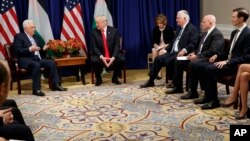Jordanian Foreign Minister Ayman Safadi says he told U.S. Secretary of State Rex Tillerson of the "dangerous consequences" that would follow if the United States recognizes Jerusalem as Israel's capital.
"Such a decision would trigger anger across Arab Muslim worlds, fuel tension and jeopardize peace efforts," Safadi said on Twitter.
U.S. President Donald Trump is expected to make an announcement this week concerning his administration's policy on Jerusalem.
Trump's son-in-law and senior aide Jared Kushner said at an event Sunday the president had not yet made up his mind.
"He's still looking at a lot of different facts," Kushner said.
U.S. officials said last week that Trump was expected to recognize Jerusalem as the Israeli capital, but put off deciding to move the U.S. embassy to there from its current location in Tel Aviv.
WATCH: Jared Kushner on Trump's decision
Israel seized control of Jerusalem in the Six Day War in 1967, and later annexed east Jerusalem -- a move never recognized by the world community. The Palestinians want East Jerusalem as the capital of a future state, while Israel contends the entire city is its undivided capital.
Palestinian President Mahmoud Abbas warned Sunday that either moving the embassy or the recognition of Jerusalem as the Israeli capital would be a threat to the Middle East peace process.
An Abbas advisor said he spent much of Sunday calling several world leaders to "explain the dangers of any decision to move the embassy to Jerusalem or recognize (Jerusalem) as Israel's capital."
Chief Palestinian negotiator Saeb Erekat said the U.S. is "playing with fire."
Hamas has called for a new intifada -- an uprising -- if the embassy is moved.
A law enacted under former President Bill Clinton calls for the U.S. Embassy to move from Tel Aviv to Jerusalem unless the current president signs a waiver every six months to block the move in the name of national security. Every president has signed the waiver since the law was created in 1995, including Trump.







